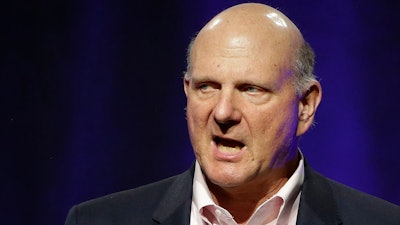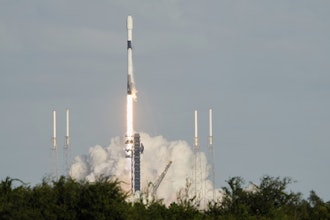
PROVIDENCE, R.I. (AP) — Steve Ballmer says he started his new venture, USAFacts, as a way to "suck out all the data" collected by government agencies and shoot it back out to the public in a digestible form. The former Microsoft CEO, philanthropist and LA Clippers owner talked with The Associated Press about data —and the way people and machines collect it.
The interview has been edited for length and clarity.
Q: Microsoft is making a big push now on artificial intelligence. Do you think they're doing enough?
A: We made a huge investment. People love to change the name over time. If you go back, we were doing speech recognition. Speech recognition's a form of AI. We were doing computer vision. It's a form of AI. We've been doing machine learning. It's a form of AI.
Before all that, we were actually calling it AI and doing a bunch of AI. So I would say we've been working pretty coherently and consistently since the early '90s.
The thing that has really changed in AI is the amount of data you can collect to inform the machine so it can get smarter in its learning. Search engines were really the first big, high-popularity AI systems. Now we have digital assistants like Cortana, Alexa, Siri. Self-driving cars are basically machine-learning AI engines. They learn to recognize where other cars are and what actions to take.
So there are a variety of things now that are popping. But it's an investment Microsoft was making, certainly when I was there, and, by everything I read, as an external, third-party shareholder, the company continues to make good and important investments.
Q: What was your impetus for starting USAFacts?
A: I'm a numbers guy. I'm retired and my wife was talking with me about our philanthropic stuff and I highlighted that government has the most significant role. And that just got me interested in the broader issue of, where does our tax base come from? Where does it go to? Who's it benefiting? That wound up being a separate interest from the rest of our philanthropy.
Q: There's been concern that funding for the U.S. Census Bureau could be scaled back. How would that affect what you're doing?
A: We use Census Bureau data. We don't create any of our own data. We're mostly repackaging. It's fundamental for us that we continue to get the kind of data that the country gets, not only out of the every-10-year census, but there are a bunch of other surveys the Census Bureau runs that are very important.
Q: Is that something you plan to weigh in on?
A: I'm going to weigh in on the fact that we need the data. Sometimes you need better tools and better systems and sometimes you need more people, more budget. I don't know about that because I don't run the department. But I do know the outcome. The production of census data is super-important. I will certainly be an advocate for that.























